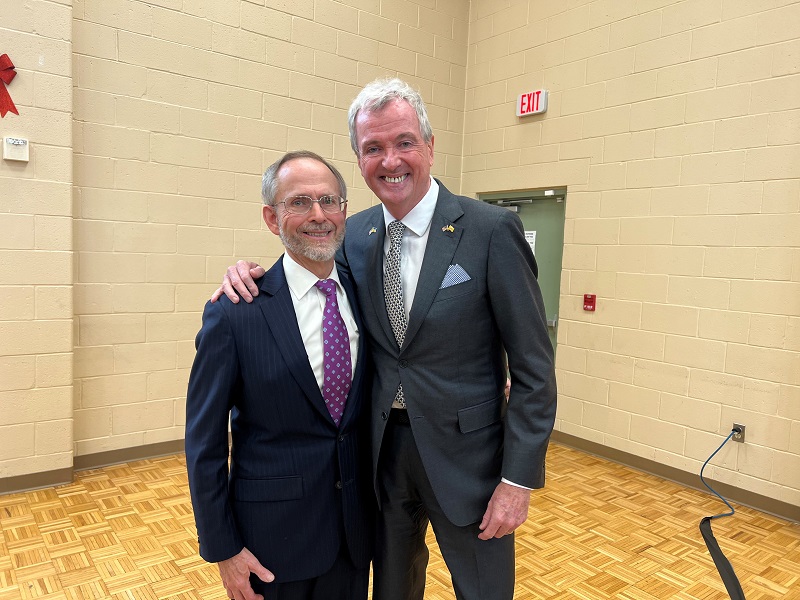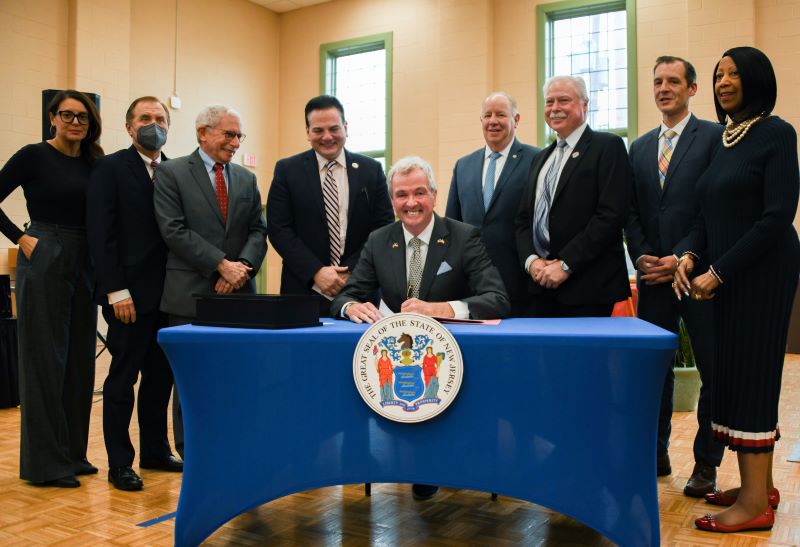Gov. Phil Murphy (seated) visited Elizabeth on Thursday to sign into law a bill allowing developers to hire private code inspectors if local officials cannot complete a review within three business days of a requested date. — Courtesy: Governor’s Office
By Joshua Burd
Gov. Phil Murphy has signed into law a bill that aims to speed up construction permitting in New Jersey, allowing developers to hire private-sector code inspectors if local officials cannot complete a review within three business days of a requested date.
The measure, A573, is a major win for the state’s commercial real estate industry and a long-awaited change to the Uniform Construction Code, one that developers and property owners have pushed for in recent years. Proponents say the move will streamline construction projects, promote economic development and grow New Jersey’s housing stock, while still leaving municipalities in charge of final approvals and certificates of occupancy.
Murphy signed the bill on Thursday during an event in Elizabeth, where he and Lt. Gov. Sheila Oliver also announced the award of more than $19 million in funding for affordable housing projects throughout the state.
“As we enter a new year, this administration’s mission remains the same — we will continue to make New Jersey stronger, fairer, and more affordable for all of our residents,” Murphy said. “Today’s bill signing will speed up the construction permitting process, making sure that developers are able to complete their projects without delay. The over $19 million investment will aid in the completion of 79 affordable housing units across our state. These steps will bring us closer to providing quality and affordable homes to our residents.”
As the governor’s office noted, A573 allows developers to contract with third-party, on-site agencies to conduct an inspection if local code officials cannot do so within three days of the requested date. The bill also provides local governments with several avenues to make their inspection process more timely, including a more streamlined bidding process to outsource the reviews or entering into shared services agreements to consolidate work among multiple municipalities.
Outside inspectors must be licensed by the Department of Community Affairs, which will implement the new framework over the next nine months.
“The bill signed today will foster a more efficient system of handling building code inspections that will result in a more affordable housing market, revitalized economic strength and additional career and business opportunities in the construction industry,” said Jeff Kolakowski, CEO of the New Jersey Builders Association. “I applaud Governor Murphy, Lt. Governor Oliver, legislative sponsors and coalition partners for a truly collaborative process that allowed us to find a sensible solution to a problem that has quietly plagued the state’s residents and its development and business communities for years. This is prime example of good governance and how the public and private sectors can come together to better meet the needs of our state.”
Murphy conditionally vetoed a third-party inspection bill in fall 2021, despite unanimous approval by the Legislature. At the time, he cited concerns over a proposal that would allow towns and cities to offer expedited reviews for an additional fee, which he said “could create a two-track system that moves smaller developers and homeowners to the back of the line in favor of those who can pay a premium.”
Supporters of the reform have long argued that municipal code officials in New Jersey are overextended, leading to project delays and a lack of predictability for developers. Those advocates have long included NAIOP New Jersey, which first raised the issue when Murphy was campaigning for governor in 2017.

“It was rewarding to be at this bill signing,” NAIOP New Jersey CEO Michael McGuinness said. “It culminated a multiyear collaboration with the Legislature, Governor’s office, NJDCA and private industry groups to address a longstanding problem — accessing a shrinking number of public construction inspectors — a problem that only worsened during the pandemic.
“Thanks to this new law, we will reduce project disruptions and delays and create jobs for non-college bound individuals and building trade workers.”
Murphy, meantime, noted that the new law brings New Jersey in line with several other states where private-sector professionals supplement government inspections.
“This common sense legislation will help ordinary citizens cut through bureaucratic red tape and expedite important inspections which will help spur the economy,” state Senate President Nick Scutari said. “We are also making important investments in affordable housing that will help make homes more affordable for families who face financial obstacles in finding places to live. These efforts will make housing more affordable and improve the quality of life for residents in diverse communities.”
The bill’s primary sponsors include Robert J. Karabinchak, Roy Freiman, Clinton Calabrese and Louis D. Greenwald in the Assembly and Scutari and Patrick J. Diegnan Jr. in Senate.
Bill to allow third-party code inspections awaits action by Murphy










